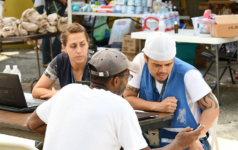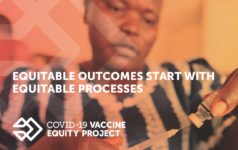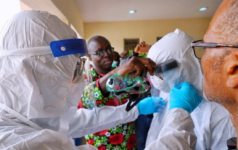Dalberg uses cookies and related technologies to improve the way the site functions. A cookie is a text file that is stored on your device. We use these text files for functionality such as to analyze our traffic or to personalize content. You can easily control how we use cookies on your device by adjusting the settings below, and you may also change those settings at any time by visiting our privacy policy page.
Dalberg is a member of the Every Breath Counts Coalition (EBCC), the world’s first public-private partnership to support national governments to end preventable child pneumonia deaths by 2030.
Across 2019, Dalberg and other EBCC partners worked closely with the Nigerian Federal Ministry of Health (FMoH), State Ministries of Health, the National Primary Healthcare Development Agency (NPHCDA), private sector partners, civil society and faith-based organizations, and many others to help develop the first-ever National Integrated Pneumonia Control Strategy and Implementation Plan.
On 29 January 2020 at the first-ever Global Forum on Childhood Pneumonia in Barcelona, Spain, the State Minister of Health from Nigeria presented this ambitious plan. The vision of the strategy is to reduce newborn and child morbidity and mortality caused by pneumonia—aligned and incorporated within the Federal Government of Nigeria (FGN) integrated health goals and planning, Sustainable Development Goal (SDG) 3.2 to end under-five preventable deaths, and the Global Action Plan on Pneumonia and Diarrhea (GAPPD) target to reduce newborn and child pneumonia deaths to less than 3 per 1,000 live births by 2030.
Here are the key learnings we took away from the development of the plan – information that we hope can benefit the wide variety of organizations that are essential to stopping the spread of pneumonia.
Integration is key
The goal of the strategy developed by the Nigerian FMoH is to elevate pneumonia interventions within an integrated approach to newborn and child health. This includes, for example, making sure that pneumonia commodities are always available as a part of Integrated Community Case Management (iCCM)—a strategy designed to complement and extend the reach of public health services by providing timely and effective treatment of malaria, pneumonia, and diarrhea to populations with limited access to facility-based healthcare providers.
This approach resonated with EBCC partners, who consistently provided concrete feedback about how to better integrate the strategy within existing community- and facility-based delivery programming and platforms (e.g., iCCM and Integrated Management of Childhood Illness, an integrated approach that includes both preventative and curative elements to support the health of the whole child).
But at times we faced tension—how can we increase attention for a disease while maintaining an integrated approach? Over time, we worked to find a balance between advocacy and policy efforts for pneumonia, specifically paired with recommendations for integrated delivery of interventions and services.
The final strategy for the Nigerian FMoH does not recommend disease-focused programming; rather, it recommends coordination and accountability mechanisms to improve pneumonia control within existing policies and strategies. This ensures that partners address pneumonia in a way that strengthens community and primary health systems—with important benefits not only for pneumonia but also for other leading killers of newborns and children (e.g., diarrhea, malaria). For example: at the Pneumonia Forum, UNICEF released analysis showing that scaling up pneumonia control globally could prevent ~3 million deaths from pneumonia and ~6 million deaths from other diseases.
The value of cross-sector perspectives, public and private
The FMoH strategy recognizes that pneumonia control is complex. It requires strong coordination across a range of partners and sectors to deliver 10+ interventions that protect against, prevent, diagnose, and treat pneumonia (at the Pneumonia Forum, these interventions were shown within a “pneumonia wheel”). Interventions relate to clinical care, nutrition, clean fuels, immunization, community empowerment, water and sanitation, and more. Therefore, the strategy recommends securing champions, driving policy implementation, and mobilizing sustainable financing in health, agriculture, education, women’s empowerment, and environment.
The strategy also recognizes the role of engaging and working with the private sector to deliver these interventions. For example, a large share of people in Nigeria seek healthcare at private Patent and Proprietary Medicine Vendors (PPMVs). The strategy focuses on public and private channels where caregivers of newborns and children can access high-quality care.
The importance of international, national, community collaboration
Efforts across international, national, and subnational players contributed to the successful development of the strategy and implementation plan.
At the international level, the Every Breath Counts Coalition brought renewed focus and attention to countries with the highest pneumonia burdens, and helped drive collaboration with the FMoH in 2018 to launch the process to develop a pneumonia control strategy. Led by the FMoH, this included support from partners such as USAID, Save the Children, UNICEF, and the Clinton Health Access Initiative.
At the national level, the Federal Ministry of Health then led this process, supported by critical input from other federal government agencies and country-level EBCC partners.
Sub-nationally, State Ministries of Health and community members attended stakeholder workshops, shared feedback, and generated momentum around the strategy.
Getting specific about financing
Implementing the strategy will require identifying and filling financing gaps—given the need to scale interventions while reducing out-of-pocket expenditures (OOP) that can bankrupt families.The strategy will first look to mobilize domestic resources and then bring in international support.
However, given that the strategy builds on existing efforts, most resources required are linked to ongoing integrated programming, such as routine immunization, iCCM, and IMCI.
To support initial planning, the strategy provides directional estimates of resources required to implement catalytic activities. Specifically, we estimated national needs are approximately USD 1 million, and subnational needs are approximately USD 1 million per state, depending on population size. Going forward, governments and partners will need to undertake more detailed, bottom-up costing efforts to ensure integration into budgets.
Focus on equity
Pneumonia is a disease that disproportionately affects the vulnerable and is often referred to as a “disease of poverty.” In his speech in at the Global Forum, the State Minister of Health for Nigeria noted that a poor child is approximately two times more likely to die from pneumonia.
The strategy therefore aims to ensure all newborns and children in Nigeria—with a focus on those from low income households, vulnerable populations, and hard-to-reach areas—benefit from improved efforts to protect against, prevent, diagnose, and treat pneumonia.
Here, the strategy takes into account subnational differences: it focuses and directs resources to high-burden populations and recommends tailoring of activities at the state and local levels, based on the drivers and burden of pneumonia. The community focus of the strategy is critical to reach the “last mile” and to overcome geographic inequalities.
Strategy as advocacy
Overall, Nigeria’s National Integrated Pneumonia Control Strategy and Implementation Plan is a strong starting point to better protect against, prevent, diagnose, and treat pneumonia over the next five years. While much work remains to be done, the strategy process has helped “put pneumonia on the map” in Nigeria—which is critical given that one of the main challenges is limited awareness (at all levels, from mothers to government officials) of this “forgotten killer.”
In 2019, the strategy development process created meaningful reflection and dialogue about barriers and solutions; unified partners at country-level; and led to concrete commitments from partners to integrate relevant activities into their programming.
Going forward to 2020 and beyond, we look forward to continuing to work with our partners from Nigeria—as well as from other countries—to reduce preventable newborn and childhood deaths caused by pneumonia. A critical next step is domesticating—and implementing—the strategy at the state level. This will begin in the coming months, spearheaded by a dissemination currently being planned by the FMoH.

















